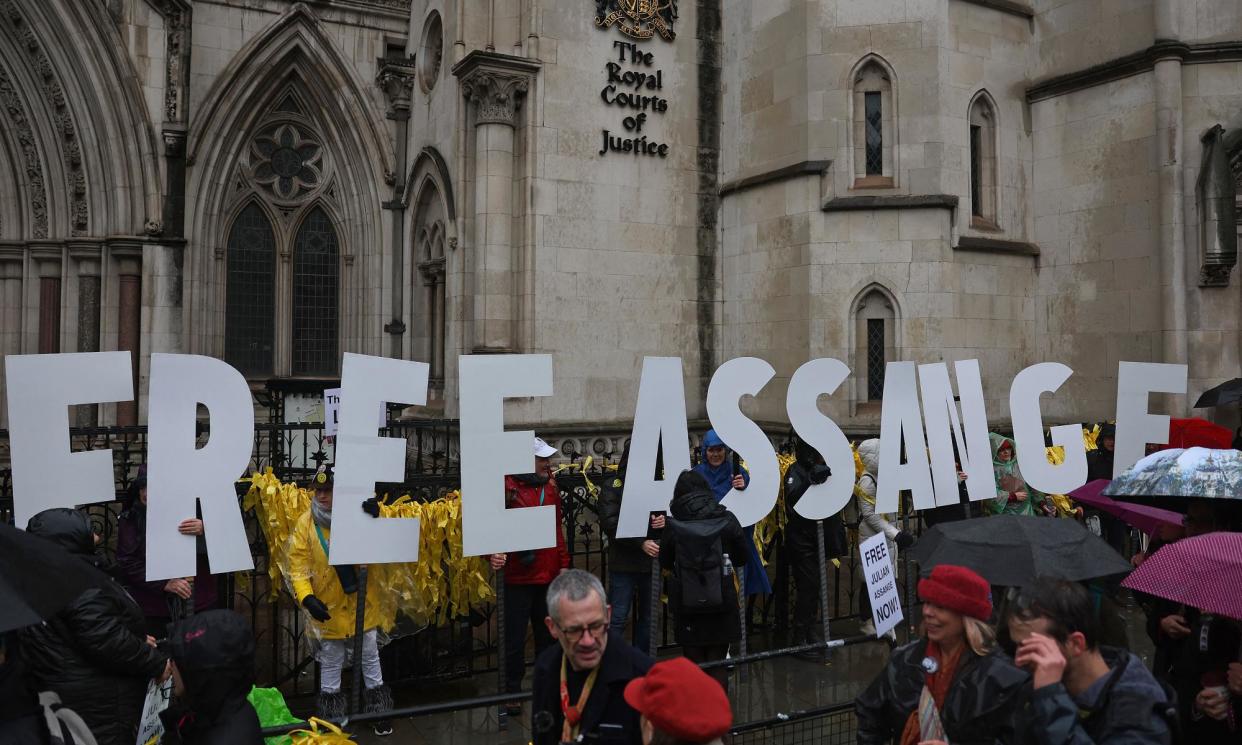Julian Assange wins temporary reprieve in case against extradition to US

Julian Assange has been handed a reprieve in his fight against extradition to the US after two judges ruled the WikiLeaks founder could take his case to an appeal hearing – but only if the Biden administration is unable to provide the court with suitable assurances.
The president of the king’s bench division, Victoria Sharp, and Mr Justice Johnson said Assange had real prospects of success on three of the nine grounds argued, but adjourned the leave to appeal application to give the US government three weeks to provide reassurance on the relevant matters.
If Assange had been denied permission to appeal he could have been extradited within days to face espionage charges. While the judges’ decision means he avoids that fate it leaves him facing a further wait, with his future still unresolved.
In a written judgment, handed down on Tuesday morning, Sharp said the concerns that had real prospects of success at appeal but which “may be capable of being addressed by assurances” were “that the applicant [Assange] is permitted to rely on the first amendment, that the applicant is not prejudiced at trial, including sentence, by reason of his nationality, that he is afforded the same first amendment protections as a United States citizen, and that the death penalty is not imposed”.
At a two-day hearing last month, which Assange was too unwell to attend, his lawyers argued that he faced a “flagrant denial of justice” if extradited to the US to face charges relating to the publication by Assange and WikiLeaks of thousands of classified and diplomatic documents they said had exposed torture, rendition, extrajudicial killings and war crimes.
His wife, Stella Assange, expressed dismay at the judges’ decision. “What the courts have done has been to invite a political intervention from the United States … send a letter saying ‘its all OK’,” she said. “I find this astounding.
“This case is a retribution. It is a signal to all of you that if you expose the interests that are driving war they will come after you, they will put you in prison and will try to kill you.
“The Biden administration should not issue assurances. They should drop this shameful case that should never have been brought.”
Ahead of the decision there had been reports that the US government was considering a plea deal offer to Assange, allowing him to admit to a misdemeanour, which would enable him to walk free from prison in the UK but his lawyers said they had been “given no indication” Washington intended to change its approach.
Sharp stated in Tuesday’s 66-page judgment that the UK home secretary’s lawyer had accepted that there was nothing in place to prevent Assange being charged in the US with an offence that carried the death penalty and it then being imposed.
She cited as evidence of such a risk “the calls for the imposition of the death penalty by leading politicians and other public figures; the fact that the [UK-US extradition] treaty does not preclude extradition for death penalty charges, and the fact that the existing assurance does not explicitly cover the death penalty”.
On free speech protections under the first amendment in the US, Sharp said: “He [Assange] contends that if he is given first amendment rights, the prosecution will be stopped. The first amendment is therefore of central importance to his defence to the extradition charge. Further, if he is convicted, he may wish to invoke the first amendment on the question of sentence. If he is not permitted to rely on the first amendment because of his status as a foreign national, he will thereby be prejudiced – potentially very greatly prejudiced – by reason of his nationality.”
The US has been given until 16 April to file its assurances. If it does not do so, leave to appeal will be granted. If it does provide assurances by that date the parties will be invited to file further written submissions on the issue of leave to appeal with another hearing provisionally listed for 20 May.
Michelle Stanistreet, the general secretary of the National Union of Journalists, welcomed the “temporary reprieve” but called on the US to pursue a plea deal.
“The conditionality around the grounds of appeal, which are contingent on the examination of US government assurances that he will not face the death penalty and has the right to free speech, mean the risks to Assange and press freedom remain stark,” she said.

 Yahoo News
Yahoo News 
